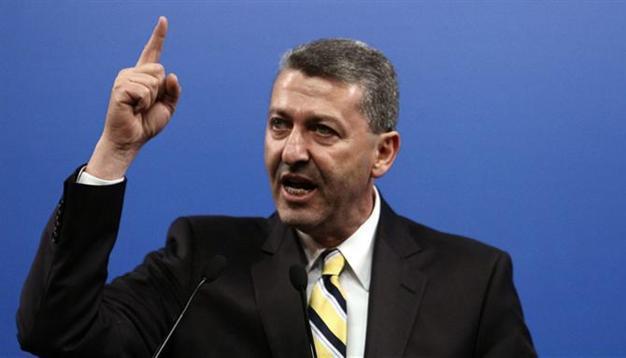Greek Cypriot leaders start to woo Lillikas supporters
NICOSIA – Reuters

Greek Cypriot presidential election candidate George Lillikas. AFP Photo
Greek Cypriot political leaders began today a week of bargaining after the first round of a presidential election failed to produce an outright winner to steer the country through its worst financial crisis in four decades.Conservative leader Nicos Anastasiades, who backs a swift deal with European Union and International Monetary Fund lenders on a bailout to avert a bankruptcy, won the Feb. 17 vote but fell short of the absolute majority needed to avoid a run-off on Feb. 24. He faces Communist-backed Stavros Malas in that round.
Complicating matters for investors, both leading candidates must court voters who backed runner-up George Lillikas, an independent deeply suspicious of terms for any bailout - which he says may keep Greek Cyprus in perpetual bondage to foreign lenders.
“Our country is at a crucial juncture,” Lillikas told his supporters, refusing to disclose which candidate he would back. “We will support policies which defend the sovereignty of the Republic of Cyprus, and every policy which defends our national interests and is resistant to the will of foreigners.”
Politis daily speculated Anastasiades would work on luring support from the Socialist EDEK party, which was the primary backer of Lillikas’ independent bid, and not Lillikas himself.
The anti-austerity campaigner Lillikas turned in a surprisingly strong performance in the election, taking 25 percent of the vote and trailing Malas, who campaigned on a pro-bailout but anti-austerity platform, by just 2 points. A lawyer who has led the Democratic Rally party since 1997, Anastasiades secured 45.4 percent and remains the favorite to clinch a victory next week. Most Greek Cypriot newspapers speculated it was a foregone conclusion that Anastasiades would win the second round. “The coronation was postponed,” Phileleftheros daily said in a headline.
“I will reach out to political leaders, seeking to broaden the public mandate we have even more,” Anastasiades told cheering supporters after the first round.
“[It is a mandate] to get rid of a leadership which led us to food rationing, unemployment and misery.”
If successful, Anastasiades faces a long list of challenges in convincing EU and IMF lenders to sign off on a rescue before the country faces a 1.4 billion euro debt repayment in June.
Greek Cyprus sought financial help last year after its banks suffered huge losses from Greece’s sovereign debt restructuring. It has been shut out of international financial markets since May 2011 and needs about 17 billion euros in aid, roughly the same as its gross domestic product.
















